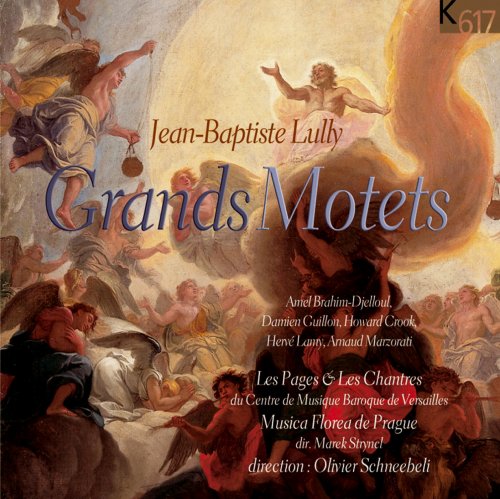
Olivier Schneebeli - Jean-Baptiste Lully: Grands Motets (2005)
BAND/ARTIST: Olivier Schneebeli
- Title: Jean-Baptiste Lully: Grands Motets
- Year Of Release: 2005
- Label: K617
- Genre: Classical
- Quality: FLAC (image + .cue, log, scans)
- Total Time: 52:13
- Total Size: 309 MB
- WebSite: Album Preview
Tracklist:
Jean-Baptiste Lully (1632-87)
Jubilate Deo
1 Jubilate Deo omnis terra 2’12
2 Reges terrae et omnes populi 2’54
3 Arcum conterit 1’36
4 Jubilate Deo omnis terra 1’27
5 Taliter non fecit omni nationi 3’03
6 Jubilate, in conspectu regis 2’17
Miserere
7 Miserere mei Deus 3’16
8 Amplius lava me 3’02
9 Tibi soli peccavi 1’38
10 Ecce enim veritatem dilexisti 0’59
11 Asperges me 2’38
12 Averte faciem tuam 1’15
13 Ne projicias me a facie tua 1’55
14 Docebo iniquos vias tuas 1’58
15 Domine labia mea aperies 1’36
16 Sacrificium Deo spiritus contribulatus 1’26
17 Benigne fac Domine 0’26
18 Tunc acceptabis 1’23
Quare fremuerunt
19 Quare fremuerunt gentes 2’01
20 Dirumpamus vincula eorum 0’48
21 Qui habitat in caelis 1’50
22 Ego autem constitutus sum rex 2’04
23 Postula a me 1’36
24 Et nunc reges intelligite 1’51
25 Apprehendite disciplinam 1’11
26 Beati omnes qui confidunt in eo 2’51
27 Domine salvum fac regem 3’06
Jean-Baptiste Lully (1632-87)
Jubilate Deo
1 Jubilate Deo omnis terra 2’12
2 Reges terrae et omnes populi 2’54
3 Arcum conterit 1’36
4 Jubilate Deo omnis terra 1’27
5 Taliter non fecit omni nationi 3’03
6 Jubilate, in conspectu regis 2’17
Miserere
7 Miserere mei Deus 3’16
8 Amplius lava me 3’02
9 Tibi soli peccavi 1’38
10 Ecce enim veritatem dilexisti 0’59
11 Asperges me 2’38
12 Averte faciem tuam 1’15
13 Ne projicias me a facie tua 1’55
14 Docebo iniquos vias tuas 1’58
15 Domine labia mea aperies 1’36
16 Sacrificium Deo spiritus contribulatus 1’26
17 Benigne fac Domine 0’26
18 Tunc acceptabis 1’23
Quare fremuerunt
19 Quare fremuerunt gentes 2’01
20 Dirumpamus vincula eorum 0’48
21 Qui habitat in caelis 1’50
22 Ego autem constitutus sum rex 2’04
23 Postula a me 1’36
24 Et nunc reges intelligite 1’51
25 Apprehendite disciplinam 1’11
26 Beati omnes qui confidunt in eo 2’51
27 Domine salvum fac regem 3’06
Grands motets, requiring lavish vocal and instrumental resources, always signalled important occasions at the French court.
Until the advent of public concerts in Paris in the 1720s they were performed exclusively by the king's musicians for the court. Olivier Schneebeli has assembled an admirable survey of these large-scale settings of psalm texts, which were excerpted and arranged to convey doubles entendres flattering to Louis XIV and his policies. The music employs an orchestra with a full continuo complement, a choir and a petit choeur of soloists that relies on high male voices. The only concession to modern times is the use of sopranos instead of castrati in the top part and the inclusion of girls among the pages. The survey begins with Lully's first grandmotet, the Jubilate Deo (1660), celebrating both the marriage of the king and a peace treaty. The Miserere (1663), frequently performed during Lully's lifetime, has remained his best-known work. Quare fremuerunt (1685) was composed at a difficult time, when he most needed to please the king. From first to last, one can easily hear the ways in which Lully experimented with his forces, refining the role of the orchestra, the ways in which the soloists relate to the choir, and how he was influenced by his experience of opera. The singers are attentive to Schneebeli's direction; the five soloists contribute singly, in dialogue with one another and in concert with the choir. Musica Florea's sweet sound suggests a refreshing departure from current ideas of Lullian style. — Gramophone Classical Music Guide, 2010
Until the advent of public concerts in Paris in the 1720s they were performed exclusively by the king's musicians for the court. Olivier Schneebeli has assembled an admirable survey of these large-scale settings of psalm texts, which were excerpted and arranged to convey doubles entendres flattering to Louis XIV and his policies. The music employs an orchestra with a full continuo complement, a choir and a petit choeur of soloists that relies on high male voices. The only concession to modern times is the use of sopranos instead of castrati in the top part and the inclusion of girls among the pages. The survey begins with Lully's first grandmotet, the Jubilate Deo (1660), celebrating both the marriage of the king and a peace treaty. The Miserere (1663), frequently performed during Lully's lifetime, has remained his best-known work. Quare fremuerunt (1685) was composed at a difficult time, when he most needed to please the king. From first to last, one can easily hear the ways in which Lully experimented with his forces, refining the role of the orchestra, the ways in which the soloists relate to the choir, and how he was influenced by his experience of opera. The singers are attentive to Schneebeli's direction; the five soloists contribute singly, in dialogue with one another and in concert with the choir. Musica Florea's sweet sound suggests a refreshing departure from current ideas of Lullian style. — Gramophone Classical Music Guide, 2010
Related Release:
Classical | FLAC / APE | CD-Rip
As a ISRA.CLOUD's PREMIUM member you will have the following benefits:
- Unlimited high speed downloads
- Download directly without waiting time
- Unlimited parallel downloads
- Support for download accelerators
- No advertising
- Resume broken downloads


